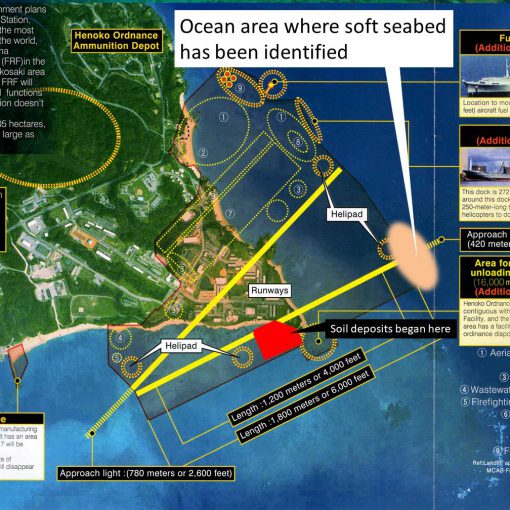October 18, 2018 Ryukyu Shimpo
When Okinawa’s former governor revoked approval for land filling activities as part of the relocation of MCAS Futenma to Henoko in Nago City, the Japanese government took countermeasures. Those came in the form of demanding that the Minister of Land, Infrastructure, and Transportation to review the revocation under the Administrative Appeal Act and cancel the efficacy of the revocation.
In the September 30 gubernatorial election, where Denny Tamaki, the candidate opposed to new base construction, beat his Henoko relocation supporting and Abe administration-backed opponent in a landslide. While this is the second straight time the people of Okinawa have clearly voiced their position in a gubernatorial election opposing a base relocation within Okinawa, the Japanese government continuing to force through the land filling activities can only be called a reckless trampling of democratic values.
To begin with, the Administrative Appeal Act was passed with the purpose of supporting citizens’ rights and interests when a government agency acts illegally or inappropriately. Therefore, the government itself cannot use the same law in this way.
Regardless, when the land-filling approval was revoked by Okinawa in 2015, the Okinawa Defense Bureau (ODB) stressed that they were a “private entity,” and requested that the revocation be suspended. This was accepted by the Minister of Land, Infrastructure, and Transportation. For the government to abuse a system made for a regular citizen by insisting that the ODB is a “private entity,” is tantamount to fraud.
The government is once again is taking unthinkably tyrannical measures for a nation of laws. Will the Minister of Land, Infrastructure, and Transportation again use this deceit to support a fixed game?
Keiichi Ishii, the Minister of Land, Infrastructure, and Transportation is a member of the Komeito Party. The Komeito Party head office of Okinawa actually opposes of the relocation of MCAS Futenma. The Okinawa Komeito office should work to see that this absurd endeavor not move forward.
Minister of Defense Takeshi Iwaya, who made the request to the Minister of Land, Infrastructure, and Transportation, stressed, “We are working to remove the dangers of MCAS Futenma and return the land as quickly as possible.” While he commented that he “takes very seriously” the results of the Okinawa gubernatorial election, he made clear his policy to continue with the relocation, citing the need to maintain the U.S. military’s presence as a deterrent, while also alleviating the burden of the bases on Okinawa.
While “deterrence” has become a cliché, its foundation was not explained in a logical manner. The U.S. Marines main duties include amphibious assault utilizing helicopters and amphibious assault vehicles, as well as land-based special operations.
From a military standpoint, many experts have stated that the reasons for deploying the Marines to Okinawa are meager. Okinawa already hosts many U.S. military bases including Kadena Air Base, the largest U.S. base in the Asia-Pacific region. If MCAS Futenma were to no longer exist, it would pose no hindrance to the U.S. military.
Governor Tamaki has appealed to the country, “People of Japan, I want you all to see clearly that despite Okinawa’s overwhelming opposition to a new base, the current administration has responded to the will of the people in an authoritarian manner.”
The path of dialogue with Okinawa has been shut from one side, and without the ability to argue the new base construction plunges ahead. The behavior of the Abe administration, violating the will of the people of the region, should be threatening to people all over Japan. This is not a problem for Okinawa alone.
(English translation by T&CT and Sam Grieb)



